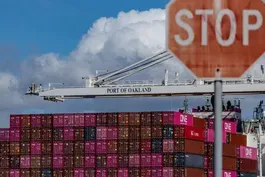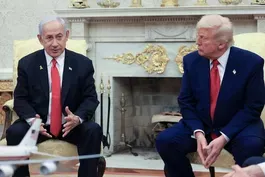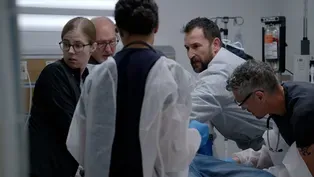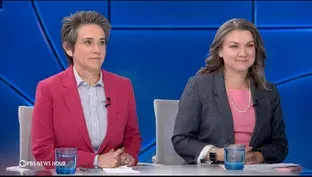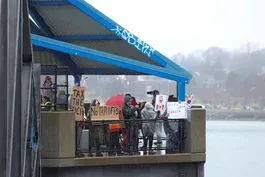
Taiwan prepares citizens for potential invasion by China
Clip: 4/7/2025 | 7m 46sVideo has Closed Captions
With future at risk, Taiwan prepares citizens to resist potential Chinese invasion
Taiwan’s government wants the island and its citizens to become more resilient and ready for a potential Chinese invasion or blockade. It's a threat the government is increasingly willing to warn might be coming. Nick Schifrin reports for our series, Taiwan: Risk and Resistance.
Problems with Closed Captions? Closed Captioning Feedback
Problems with Closed Captions? Closed Captioning Feedback
Major corporate funding for the PBS News Hour is provided by BDO, BNSF, Consumer Cellular, American Cruise Lines, and Raymond James. Funding for the PBS NewsHour Weekend is provided by...

Taiwan prepares citizens for potential invasion by China
Clip: 4/7/2025 | 7m 46sVideo has Closed Captions
Taiwan’s government wants the island and its citizens to become more resilient and ready for a potential Chinese invasion or blockade. It's a threat the government is increasingly willing to warn might be coming. Nick Schifrin reports for our series, Taiwan: Risk and Resistance.
Problems with Closed Captions? Closed Captioning Feedback
How to Watch PBS News Hour
PBS News Hour is available to stream on pbs.org and the free PBS App, available on iPhone, Apple TV, Android TV, Android smartphones, Amazon Fire TV, Amazon Fire Tablet, Roku, Samsung Smart TV, and Vizio.
Providing Support for PBS.org
Learn Moreabout PBS online sponsorshipAMNA NAWAZ: We return now to our coverage of Taiwan and the threats it faces from China.
We reported last week about the Taiwanese military's efforts to modernize and prepare for a Chinese invasion or blockade.
GEOFF BENNETT: Tonight, Nick Schifrin reports on how Taiwan's government wants the island and its citizens to become more resilient and more ready for what the government is increasingly willing to warn might be coming.
It's part two of our series "Taiwan: Risk and Resistance."
NICK SCHIFRIN: It begins with a manufactured military crisis, then a manipulated broadcast.
Citizens become collaborators.
Society collapses into chaos.
MAN: Behind me, we see many American citizens of Taiwanese heritage in line for evacuation.
NICK SCHIFRIN: And then invasion.
It's a TV series called "Zero Day," as in the day China takes over Taiwan.
CHENG HSIN MEI, Showrunner, "Zero Day" (through translator): When we're facing an authoritarian invasion, everyone should set aside their differences and identity and come together to protect the way of life we cherish.
NICK SCHIFRIN: Cheng Hsin Mei is "Zero Day"'s showrunner.
The series was supported by Taiwan's government, which allowed filming in the President's House and on a Navy warship.
The National Security Council helped provide the plot.
So it's in part a government attempt to wake Taiwan up.
CHENG HSIN MEI (through translator): We want everyone to understand that war is already happening in Taiwan, with fake news, misinformation and even severed underwater cables.
These are all signs that war is getting closer.
NICK SCHIFRIN: It's sensitive to depict that war on Taiwanese TV.
More than half the crew asked to stay anonymous, fearing Chinese retribution.
But the threat and the willingness to call it out is rising.
CHENG HSIN MEI (through translator): The fact is, the really dangerous thing is not the movie.
The real dangerous thing is China.
We're not trying to divide Taiwan.
Instead, we want to unite them.
We all need to protect the safety of this land and the way of life we have here.
And that way of life is a free, democratic one.
NICK SCHIFRIN: Since the inauguration of President Lai Ching-te, Taipei has been much more willing to call out China's threat to Taiwan's democracy.
And Lai has insisted civilians prepare for war, part of those preparations, training exercises like this, simulating a missile strike.
Taiwan has long prepared for natural disasters.
But now that preparation is tied to resisting Chinese influence or invasion.
LAI CHING-TE, Taiwanese President (through translator): We hope Taiwan's society can be resilient.
We should rely not on the enemy not coming, but on our own readiness to receive him.
LIU SHYH-FANG, Taiwanese Interior Minister: We don't want to be isolated by China.
NICK SCHIFRIN: Liu Shyh-Fang is Taiwan's interior minister.
LIU SHYH-FANG: If the kind of gray area attack by China or by some other enemy happens, we have to have well preparedness.
NICK SCHIFRIN: You mean, if there is some kind of attack from Beijing or another adversary, you will be ready for it?
LIU SHYH-FANG: We hope so.
NICK SCHIFRIN: Taipei is planning to stockpile blood, food, even nationalized buses and taxis if they have to transport soldiers.
And they're creating some 80,000 shelters, this one in the basement of a metro station.
The metro manager and the deputy interior minister show us a site that can withstand a 500-pound bomb and hold 12,000 people with emergency power, water and cell reception.
They say, the better they can prepare, the longer they can hold out.
MAA SHYH-YUAN, Taiwanese Deputy Interior Minister (through translator): Taiwan is preparing for large-scale earthquakes, tsunamis and war at the same time.
Missile attacks or enemy air raids, that's when this space would be opened.
NICK SCHIFRIN: Are you trying to scare people?
LIU SHYH-FANG: Scare?
Why?
NICK SCHIFRIN: Are you trying to -- yes, are you trying to motivate people?
LIU SHYH-FANG: We try to motivate them, but we don't want to scare them.
I just want to tell them it will be happened, but we didn't know when or why, but we still have to be well-prepared.
NICK SCHIFRIN: And, of course, that makes it more challenging for China or anyone to execute what they want to do.
LIU SHYH-FANG: Sure.
That's right.
NICK SCHIFRIN: But Taiwan's financial systems, energy and communications are vulnerable to Chinese blockade and cyberattack, and critics worry Taiwan isn't doing enough to prepare for social and economic disruption.
There are also internal divisions.
Last week's drills were designed in part to win over cities led by the opposition party that's accused the government of scare tactics.
Do you think people still think of this as warmongering?
LIU SHYH-FANG: Well, in Taiwan, we have many opposition parties.
We have to tell them, you have to face it.
We have to be prepared.
NICK SCHIFRIN: Some Taiwanese are concerned the island isn't prepared, so they're getting ready themselves.
On a recent Saturday afternoon, young men practiced clearing a building from would-be invaders.
They're civilian volunteers.
Their guns fire plastic.
Their tactics are basic.
But these weekend warriors believe the island's future is at risk.
And they doubt the military can protect them.
Do you think there will be war?
MAN (through translator): I think so, yes.
I think there's a high chance that there will be a war.
NICK SCHIFRIN: This active-duty soldier asked we keep him anonymous.
He leads this team because he says the military needs help.
Do you think Taiwan is ready for war?
MAN (through translator): Personally, I don't think so, because Taiwan hasn't fought a war for 70 or 80 years.
I think what we lack is experience.
NICK SCHIFRIN: All Taiwanese men serve compulsory military service, and, on paper, Taiwan's reserves appear large.
But these men say military training is insufficient, so they do it themselves.
They practice a shoot-out and tend to the wounded.
They call themselves a band of brothers, but acknowledge the family isn't large enough.
MASON, Civil Defense Volunteer (through translator): Many young people today are reluctant to join the armed forces.
There's also a general lack of awareness among civilians about the importance of national defense.
NICK SCHIFRIN: That's 33-year-old Mason, a former army engineer lieutenant.
He too fears Taiwan is not ready.
Is the military doing enough to prepare for an invasion?
MASON (through translator): It's still not enough.
If we can improve the overall defense skills of the general public, it will certainly be helpful to the military during times of war.
MAN (through translator): Understanding the stakes is crucial.
If we consider the political consequences of Taiwan going to war, losing the war, losing its sovereignty, we'd be risking one of our most valuable assets, our democracy.
NICK SCHIFRIN: And so they train, knowing the peril, knowing what's at stake.
For the "PBS News Hour," I'm Nick Schifrin in Taipei, Taiwan.
Businesses face impacts of Trump's tariff policies
Video has Closed Captions
How businesses are dealing with the impacts of Trump's tariff policies (9m 11s)
News Wrap: Trump says U.S. will have direct talks with Iran
Video has Closed Captions
News Wrap: Trump says U.S. will have direct talks with Iran about nuclear program (4m 50s)
Noah Wyle on the authenticity and success of 'The Pitt'
Video has Closed Captions
Noah Wyle on the authenticity of 'The Pitt' and what makes it successful (8m 18s)
Ovechkin breaks record to become NHL's all-time goal scorer
Video has Closed Captions
Alex Ovechkin breaks Gretzky's record to become NHL's all-time leading goal scorer (7m 20s)
Tamara Keith and Amy Walter on political fallout of tariffs
Video has Closed Captions
Tamara Keith and Amy Walter on Trump's tariffs and the political fallout (9m 20s)
Trump holds firm to his tariffs and threatens more on China
Video has Closed Captions
Trump holds firm to his tariffs and threatens more on China (4m 30s)
Providing Support for PBS.org
Learn Moreabout PBS online sponsorshipSupport for PBS provided by:
Major corporate funding for the PBS News Hour is provided by BDO, BNSF, Consumer Cellular, American Cruise Lines, and Raymond James. Funding for the PBS NewsHour Weekend is provided by...
